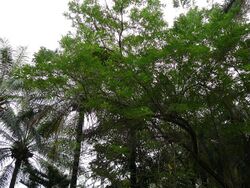Biology:Gliricidia
| Gliricidia | |
|---|---|

| |
| Gliricidia sepium | |
| Scientific classification | |
| Kingdom: | Plantae |
| Clade: | Tracheophytes |
| Clade: | Angiosperms |
| Clade: | Eudicots |
| Clade: | Rosids |
| Order: | Fabales |
| Family: | Fabaceae |
| Subfamily: | Faboideae |
| Clade: | Hologalegina |
| Clade: | Robinioids |
| Tribe: | Robinieae |
| Genus: | Gliricidia Kunth (1842) |
| Synonyms[1][2] | |
| |
Gliricidia is a genus of flowering plants in the legume family, Fabaceae and tribe Robinieae. Its native range is Mexico to Peru, but Gliricidia sepium has been widely introduced to other tropical zones.[2]
The species G. sepium is a small, deciduous, ornamental tree, cultivated and used for a variety of purposes in tropical regions. The genus name Gliricidia means "mouse killer" in reference to the traditional use of the toxic seeds and bark of G. sepium as rodenticides.[3] The tree is leafless when in flower and bears fruits during April and May in India and countries with same climate. The small flowers (barely 2 cm long) are pale pink and they are borne in dense clusters on bare twigs. Flowers fade to white or a faint purple with age. The flowers attract a lot of bees and some lycaenid butterflies—particularly the Peablue Lampides boeticus and other native birds.
Species
The following species are accepted:[2][1]
- Gliricidia brenningii (Harms) Lavin
- Gliricidia ehrenbergii (Schltdl.) Rydb.
- Gliricidia maculata (Kunth) Steud.
- Gliricidia robusta (M.Sousa & Lavin) Lavin
- Gliricidia sepium (Jacq.) Kunth
References
- ↑ Jump up to: 1.0 1.1 "Phylogeny of Robinioid Legumes (Fabaceae) Revisited: Coursetia and Gliricidia Recircumscribed, and a Biogeographical Appraisal of the Caribbean Endemics.". Systematic Botany 28 (2): 387–409. 2003. doi:10.1043/0363-6445-28.2.387. http://www.public.asu.edu/~mfwojci/pdfs/LavinetalSYSBOT2003.pdf.
- ↑ Jump up to: 2.0 2.1 2.2 Gliricidia Kunth. Plants of the World Online. Retrieved 31 August 2023.
- ↑ Abulude, F.O; Adebote, V.T. (2009). "Antibacterial investigation of crude extracts of the root bark of Gliricidia sepium". Continental J. Microbiology (3): 23–26.
External links
Wikidata ☰ Q12549487 entry
 |

